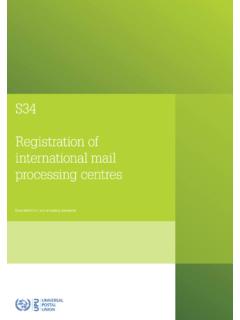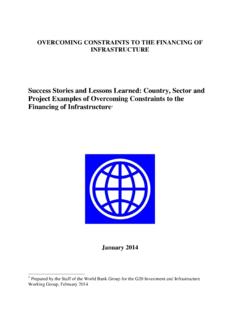Transcription of Development strategies for the postal sector: an …
1 Development strategies for the postal sector: an economic perspectiveDEVELOPMENT strategies FOR THE postal SECTOR: AN ECONOMIC PERSPECTIVED evelopment strategies for the postal sector: an economic perspectivePublished bythe Universal postal UnionDevelopment strategies for the postal sector: an economic perspectivePublished bythe Universal postal UnionThis book s findings, interpretations and conclusions are entirely those of the authors and do not necessarily represent the views of the Universal postal Union. ISBN : 978-92-95025-50-9 Eburon Academic Box 2867NL-2601 CW DelftThe / by Remy Pedretti andElliot Breckenridge Joseph, Universal postal Union, graphic art as otherwise indicated, the copyright in this publication is owned by the Universal postal Union.
2 Reproduction is authorized for non-commercial purpose, subject to proper aknowledgement of the source. This authori-zation does not extend to any material iden-tified in this publication as being the copyright of a third party. Authorisation to reproduce such third party materials must be obtained from the copyright holders concerned. Graphics credits: Elliot Breckenridge postal Union Box 3123000 BERNE 2014 Universal postal UnionPreface p. 11 Acknowledgements p. 13 INTRODUCTION Development strategies for the postal sector: an economic perspective p. 15 PART 1: SNAPSHOT AND TRENDS Chapter 1 postal economics and statistics for strategy analysis the long view p.
3 19 Jos Ans n and Matthias HelbleChapter 2 postal economics and statistics for strategy analysis the short view p. 41 Jos Ans n and Matthias HelblePART 2: MODELS Chapter 3 Status of the postal service 20 years after the Green Paper:a Franco-European perspective p. 57Jo lle Toledano BialotChapter 4 The economics of postal delivery in developing countries: learning from the Latin American and Sub-Saharan experiences p. 85 Jos Ans n, Rudy Cuadra, Altamir Linhares, Guillermo Ronderos and Jo lle Toledano BialotChapter 5 postal regulation in Sub-Saharan Africa p. 107 Marie-Odile PilleyPART 3: OPPORTUNITIES Chapter 6 Financial inclusion, postal banking and the future postal economic model p.
4 147 Jos Ans n and Jo lle Toledano BialotChapter 7 Big postal data, nowcasting and the global pulse of the economy p. 179 Jos Ans n and Matthias HelbleChapter 8 Global postal connectedness p. 193 Jos Ans n and Matthias HelbleCONCLUSION Ten key takeaways p. 219 NOTES AND REFERENCES Endnotes p. 2 27 Bibliography p. 231 1110 |PREFACEB ishar A. Hussein, Director General of the UPU International BureauI am delighted to present this second book on postal economics, produced by the International Bureau in response to requests from our member countries. The research delves into issues seldom studied by postal economists. It looks at the specific features of postal markets in developing countries and traces the emergence of new legislative and regulatory frameworks in Sub-Saharan Africa.
5 The book examines the impact of the European Green Paper, which has driven postal reform policies in the European Union. The authors also present the role and strategies of post offices in the delivery of basic financial services to all citizens, since financial inclusion as a means of fighting poverty is now again a priority in the developing analysis of long- and short-term trends based on UPU data and sta-tistics offers fresh insights into the challenges facing the postal sector in this age of connectivity. The real-time modelling of international exchanges by our researchers is a major leap forward for the UPU and will enable our experts to develop scenarios, and to measure, test and evaluate our postal network.
6 The UPU will be able to identify and remove hurdles in the postal supply chain and reduce information asymmetries. Moreover, two major lessons can be drawn for the Sub-Saharan region. First, for postal reform to succeed, the Development agenda must include an evidence-based postal policy. Second, there is no one size fits all regulatory solution. Regulatory approaches in industrialized countries cannot be automatically applied to developing countries. I thank our external contributor Professor Toledano Bialot for her invaluable contribution in reviewing the research work. Professor Toledano Bialot is a leading theoretician and practitioner who successfully chaired the UPU s postal economics groups over the last two cycles.
7 This project benefited from the generous funding by France s La Poste Group, which has always been committed to postal economics research. I express my most sincere thanks to La Poste and to France, on behalf of the entire UPU, and invite other member countries to imitate this support in the future. Finally, I thank the members of the International Bureau s Economic and Regulatory Affairs Directorate for their remarkable efforts in putting this book together and bringing UPU big data to the forefront within the UN. I look forward to having this directorate become a centre of information and excellence on postal statistics and economic analysis. Development strategies for the postal sector: an economic perspective 1312 |AKNOWLEDGEMENTSThis book is the product of a collective effort to shed light on the eco-nomics of postal markets worldwide an effort that goes far beyond the authors own contributions.
8 Numerous experts from the UPU International Bureau and other institutions have furnished insightful comments and suggestions. The authors also wish to thank the UPU s member countries for providing the information and data that feed their research and release of the book in English and French was made possible through the support of the International Bureau s translation services. The authors thank them design of a book s layout is always a time-consuming and challenging task. Here, special thanks go to the International Bureau publishing , the authors also thank Edward Elgar Publishing for authorizing the reprint of the article Status of the postal service twenty years after the Green Paper: a Franco-European perspective , by Jo lle Toledano.
9 The original version of this research can be found in chapter 15 of the book Reforming the postal Sector in the Face of Electronic Competition, edited by Michael A. Crew and Paul R. Kleindorfer, and published in the Advances in Regulatory Economics series (2013). 1514 |INTRODUCTIOND evelopment strategies for the postal sector: an economic perspectiveThis book examines the economics of the postal sector through three lenses: snapshot and trends, models, and opportunities. In the years to come, the Universal postal Union plans to develop its role as a knowledge centre for the postal sector from these this time of radical transformation of the postal sector, it is important to understand how the sector has evolved historically, how it is connected with the economic system, and where it is heading.
10 This book thus first presents a long-run view, focusing on incumbent operators over the last three decades, and then describes their Development in the last five to ten years. It also offers a real-time picture based on daily big postal data , revealing one of the greatest opportunities for the sector in terms of forecasting and product design. The book seeks to present the variety of situations in the world and their evolution, and to explain why some sector policies cannot easily be transposed from one place to another or the what not, when not, why not, where not . It introduces the European postal economic model, and then turns to developing and emerging countries to discuss the circum-stances underlying the lack of Development of their postal markets.













